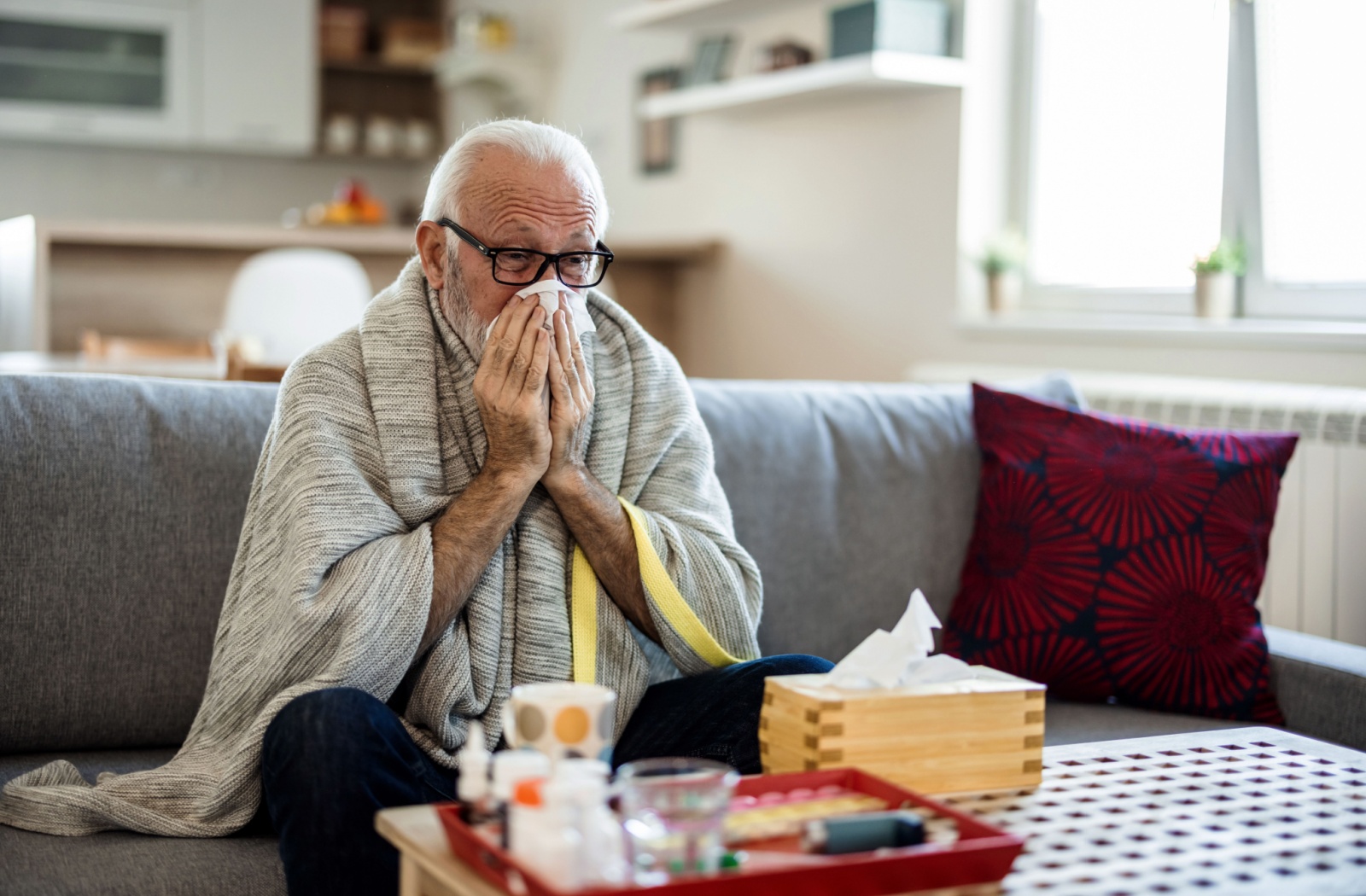Although pneumonia is a serious lung infection that can affect anyone, its risks are higher in older adults because of their relatively weaker immune systems and preexisting conditions.
Doctors categorize pneumonia into stages to grade the severity of infection and determine the right course for treatment. These four stages include:
- Congestion
- Red Hepatization
- Gray Hepatization
- Resolution
Navigating full recovery for a loved one with pneumonia can be challenging without the right support, but respite care offers a solution.
Whether your loved one is recovering from early-stage congestion or regaining strength after gray hepatization, respite care serves as a supportive bridge toward long-term health.
Understanding Pneumonia’s 4 Stages
Pneumonia progresses in four stages, each marked by distinct changes in the lungs and symptoms in the body. These stages offer insight into how the infection develops and when it becomes most dangerous, particularly for older adults.
Identifying these changes early can help prioritize timely medical interventions to reduce complications and support a loved one’s overall health and well-being.
We’ll explore each stage in detail, from its onset to recovery.
Stage 1: Congestion
The first stage of pneumonia often begins within 24 hours of the infection setting in, usually caused by bacteria, a virus, or fungi. At this point, the lung’s air sacs (alveoli) begin to fill with fluid, leading to inflammation.
Symptoms during this stage typically include:
- Mild coughing, either dry or with mucus
- Slight fever and fatigue
- Chest discomfort
- Occasional shortness of breath
This stage can sometimes be mistaken for a milder illness such as a cold or bronchitis, which is why vigilance is key, particularly with older adults who may not initially appear very ill.
Stage 2: Red Hepatization
Typically occurring two to three days after congestion starts, this stage is when the infection becomes more pronounced. The body’s immune response leads to more inflammation and a build-up of red blood cells in the alveoli.
In this stage, typical symptoms can include:
- Persistent coughing, often with thick phlegm or blood-streaked mucus
- High fever, chills, and muscle aches
- Rapid breathing or wheezing
- Shortness of breath
- General confusion (more common in older adults with weaker immune responses)
At this stage, pneumonia presents itself as more severe. If you haven’t sought medical attention already, please seek it now, especially if your loved one shows signs of high fever, confusion, or shortness of breath.
Stage 3: Gray Hepatization
Around four to six days after the infection began, pneumonia transitions into the gray hepatization phase. During this stage, the red blood cells begin to break down, and pus starts replacing fluid build-up in the alveoli.
We typically see symptoms such as:
- Worsened chest pain, particularly during coughing or deep breathing
- Persistent fever despite medications
- Extreme fatigue and weakness
- Decreased appetite or difficulty eating
This stage can further compromise oxygen flow and place additional strain on the heart, making it particularly dangerous for people with preexisting health conditions like diabetes or heart disease. Hospitalization and oxygen therapy may be necessary.
Stage 4: Resolution
The resolution stage signals the body beginning to recover and clear the infection. Gradually, the alveoli regain their normal functioning, and inflammation subsides.
During resolution, symptoms may include:
- Gradual reduction of fever
- Mucus production during coughing to clear out infection
- Noticeable improvement in breathing
- Slow return of energy and appetite
Although resolution is a positive sign, continuing proper care is necessary to verify a full recovery. Incomplete healing from pneumonia can make older adults prone to recurrent bouts of this illness.

Recovering in Respite Care
Recovering from pneumonia can be a long and often challenging process for older adults. Even after symptoms subside, the body may take several weeks or months to fully bounce back.
The full timeline for recovery depends on the illness’s severity and a person’s underlying health status. Besides, older adults may find healing slower because of the strain pneumonia takes on their overall immune system.
This is why effective recovery strategies, including respite care, can make all the difference.
Respite care provides short-term relief for families caring for older adults while residents enjoy personalized care tailored to their unique health needs.
Designed to offer a safe and nurturing environment for older adults as they recover from illness, injury, or surgery, respite care simultaneously allows families to step back from demanding caregiving responsibilities, giving everyone a chance to recharge.
Here are a few key benefits of having your loved one recover from an illness, like pneumonia, in respite care:
- Expert medical attention: Respite care programs often include personalized care plans monitored by health professionals who understand pneumonia’s challenges in older adults. This includes medication management, oxygen support, and ongoing health checks.
- Nutritious meal planning: Figuring out what to eat during recovery can be difficult, but balanced meals can help your loved one regain strength. Respite care confirms they receive nutritious meals tailored to their recovery diet.
- Comfortable environment: Recovering at home can sometimes be overwhelming for families and patients. In respite care, our staff are knowledgeable and experienced in areas of recovery, providing everyone a chance to focus on healing and comfort.
- Encouraging mobility: Rest is necessary, but extensive bed rest poses risks for older adults, like muscle deterioration. In respite care, residents balance rest and light movement to help prevent further complications.
- Reduced rehospitalization risks: With proper monitoring in a professional setting, there’s a lower chance of missed medications, dehydration, or other recovery missteps that can lead to readmission.
Supporting Recovery Through Respite Care
Pneumonia can be physically and emotionally taxing for older adults and their families. Respite care offers a solution that can transform the healing process for everyone involved.
Connect with our All American Assisted Living at Hillsborough team to schedule a tour of our respite care program.





